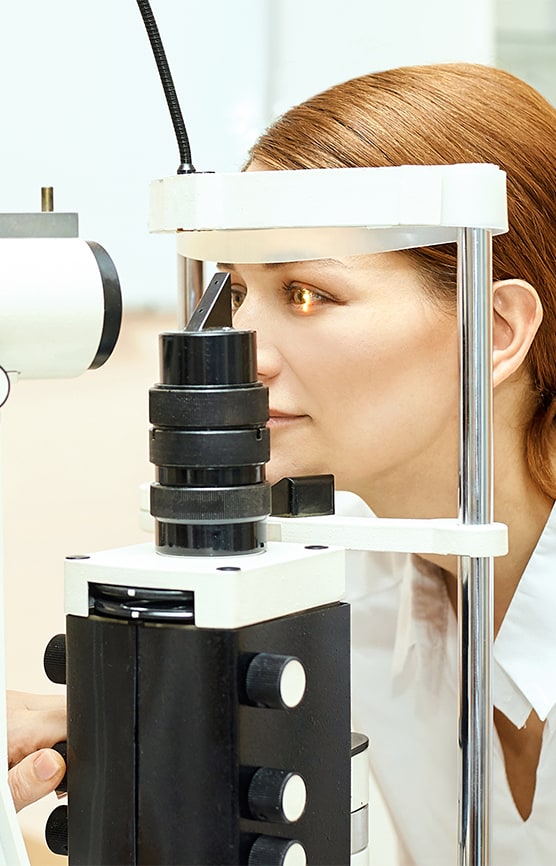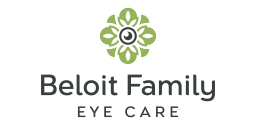Helping You Achieve Healthy Long-Term Vision
Our approach to managing and diagnosing different eye diseases is all about the details. We offer comprehensive glaucoma management, diabetic eye disease evaluations, and cataract management, and we also monitor macular degeneration.
To capture the details of your eyes, we use innovative diagnostic technology, such as optos retinal imaging, spectral domain OCT, electrophysiology testing, and corneal topography.
After gathering the necessary information about your eyes and vision, we can begin preparing a personalized treatment plan. Contact us to schedule your comprehensive eye disease evaluation today.
Book Appointment
Early Detection & Treatment
Beyond updating your prescription, regular eye exams are essential for several reasons, including early detection of eye diseases. Detecting eye diseases in their early stages can improve the effectiveness of treatment and help prevent long-term vision problems.
We aim to help you achieve and maintain clear and healthy vision through timely eye exams and treatment plans tailored to your specific needs.
Understanding the Different Forms of Eye Disease
Navigating and understanding eye diseases can be overwhelming, but you don’t have to go through it alone. Our team at Beloit Family Eye Care is here to support you every step of the way. We believe in the importance of educating our patients about their eye health and providing comprehensive management and treatment services.
We’ll take the time to explain your diagnosis, answer questions you may have, and develop a personalized treatment plan that meets your unique needs. We are committed to helping you achieve better vision and eye health so you can continue to live life to the fullest.
Glaucoma Management
Glaucoma is a group of eye disorders that cause damage to the optic nerve, which is responsible for sending visual information to your brain. Damage to the optic nerve can lead to vision loss and blindness if not detected and treated early.
The 2 most common forms of glaucoma can cause damage to the eyes due to high intraocular pressure, which is pressure within the eye. Risk factors for glaucoma include age, family history, and previous eye injuries. Regular eye exams are crucial in monitoring your vision and can help detect glaucoma in its early stages.
At Beloit Family Eye Care, we offer diagnostic tools, such as x Daytona ultra-widefield imaging, to accurately diagnose and manage glaucoma.
Diabetic Eye Disease
Diabetes can increase the risk of developing eye diseases such as glaucoma, cataracts, and diabetic retinopathy, which is the primary vision loss concern for patients with diabetes. Some symptoms of diabetic retinopathy can include blurry vision, a loss of central vision, and difficulty seeing at night.
At Beloit Family Eye Care, we use spectral domain OCT and electrophysiology testing (VEP/pERG) to diagnose and manage diabetic eye disease, along with lifestyle changes and medications as necessary.
Age-Related Macular Degeneration
Age-related macular degeneration (AMD) is a leading cause of vision loss in adults over 50. AMD affects the macula, which is responsible for sharp central vision. Symptoms can vary depending on the type of AMD you have but may include:
- Blurry or distorted vision
- Blind spots
- Difficulty seeing colors
Risk factors for AMD include age, family history, and smoking.
Our team uses diagnostic technologies, such as the Humphrey Threshold Visual Field Analyzer and the ZEISS Atlas corneal topographer, to diagnose and manage AMD. We can help you explore treatment options, including medications, lifestyle changes, and surgery.
Cataracts
Cataracts develop when the normally clear lens of the eye becomes clouded. Cataracts begin forming when proteins in the eye form clumps that prevent the lens from sending clear images to the retina, the thin layer of tissue that lines the back of the eye.
Common symptoms of cataracts can include:
- Blurry vision
- Difficulty seeing at night
- Seeing dim or yellowed colors
If cataracts progress to a later stage and prevent you from going about your daily activities, such as reading or driving, cataract surgery is the best and only option to remove them.
Keratoconus & Other Corneal Dystrophies
Corneal dystrophies, such as keratoconus, are conditions that affect the shape and clarity of the cornea, leading to vision problems. Symptoms may include:
- Blurry or distorted vision
- Sensitivity to light
- Eye irritation
Risk factors for these conditions include genetics and certain medical conditions.
At Beloit Family Eye Care, we use diagnostic techniques such as corneal topography to accurately diagnose keratoconus and corneal dystrophies. Treatment options may include specialty contact lenses, corneal cross-linking, or corneal transplant surgery.
Getting the Full Picture
We aim to deliver a full-scope optometry experience to our patients every time they visit us. Education is an integral part of our practice, and we believe in educating our patients about the different forms of eye disease and the different technology we use to monitor them before implementing treatment plans.
We offer our patients everything they need in one place, including advanced diagnostic technology, comprehensive eye exams, and tailored treatment plans designed to meet their unique needs.
Our Diagnostic Technology
While understanding the different forms of eye disease is an important first step, our diagnostic technology enables us to detect signs of eye disease early on, allowing us to develop personalized treatment plans that meet your unique needs.
Our diagnostic tools include spectral domain OCT, optos Daytona ultra-widefield imaging, the ZEISS Atlas corneal topographer, electrophysiology testing (VEP/pERG), and the Humphrey Threshold Visual Field Analyzer.
Optos Daytona Ultra-Widefield Imaging
Optos Daytona ultra-widefield imaging is an innovative technology that provides a panoramic view of the retina in a single image. This technology allows us to capture up to 200 degrees of the retina and detect potential issues or diseases, such as glaucoma, macular degeneration, or diabetic retinopathy.
With optos Daytona ultra-widefield imaging, we can provide more accurate diagnoses and develop treatment plans for our patients.
Spectral Domain OCT
Spectral domain OCT is a noninvasive imaging technology that provides high-resolution images of the retina, optic nerve, and other structures within the eye.
Spectral domain OCT allows us to detect and monitor various eye conditions, including macular degeneration, glaucoma, and diabetic retinopathy. With spectral domain OCT, we can provide early diagnosis and treatment of these conditions, helping to prevent vision loss.
Electrophysiology Testing (VEP/pERG)
Electrophysiology testing, including VEP (Visual Evoked Potential) and pERG (pattern electroretinography), is a series of tests that measure the electrical activity of the retina and optic nerve. These tests help us diagnose and monitor various eye conditions, including optic neuritis, multiple sclerosis, and vision loss due to neurological issues.
Humphrey Threshold Visual Field Analyzer
The Humphrey Threshold Visual Field Analyzer is a diagnostic tool that measures the sensitivity of your visual field. This device detects blind spots or changes in your peripheral vision, which can indicate eye diseases such as glaucoma or macular degeneration. With this information, we can create a personalized treatment plan to help preserve your vision.
ZEISS Atlas Corneal Topographer
The ZEISS Atlas corneal topographer is a diagnostic tool that provides detailed images of the cornea, which is the outer layer of the eye. This technology helps in the diagnosis and management of various corneal conditions, including keratoconus and corneal dystrophies.
With the ZEISS Atlas corneal topographer, we can provide accurate diagnoses and effective treatment plans for our patients.
Putting a Focus on Eye Disease
At Beloit Family Eye Care, our goal is to provide comprehensive care for the different forms of eye disease. To do so, we combine patient education and diagnostic technology to manage a range of eye conditions to improve your vision and overall health.
If you’re experiencing symptoms of eye disease or are at risk for developing one, contact us today to schedule an appointment and start your journey towards healthier eyes.
Book AppointmentCome Visit Us
Beloit Family Eye Care
You can find us on E Grand Ave., right across from the Beloit Art Center. We look forward to welcoming you.
- 608-365-8575
- 608-362-2655
- 531 E. Grand Ave.
- Beloit, WI 53511
Please call our practice before visiting!
Book AppointmentBrodhead Vision Clinic
You can find us on 17th St. We have convenient parking available at the side of the building for our patients.
- 608-897-2128
- 608-897-3937
- 1005 17th Street
- Brodhead, WI 53520
Please call our practice before visiting!
Book AppointmentOur Brands











